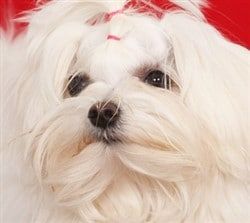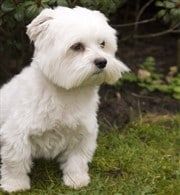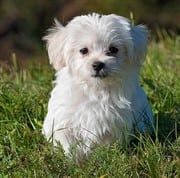Maltese Hair and Coat Issues
Overview
Unfortunately, hair issues are not uncommon with the Maltese breed. Problems can develop at any age; however, this is most often seen with Maltese 6 months and up.
When a Maltese is having issues with the coat, this may include poor hair texture. It may be dry or brittle, or hold a rough texture that is unlike the expected silky feel that the Maltese is known for.
While bad hair texture can be due to poor breeding practices, in most cases these sorts of hair problems are due to outside factors.
Another common problem is thinning coat. This may occur in just some areas or it may be an all-over thinning. In some cases, affected areas may become nearly or completely bald.
Here will will cover the common causes for hair issues seen with this breed, including those that affect the skin, since skin and coat health go hand-in-hand.
Please note:
PetMaltese is reader-supported. Some of the product suggestions on this page are affiliate links. As an Amazon Associate we earn from qualifying purchases. This is at no extra cost to you and helps us continue creating useful content.
Possible Reasons for Hair Issues and Hair Loss
Inferior food - Low quality food can cause a host of issues. And one commonly seen detrimental effect is poor skin and coat health.
There are a lot of elements that a great, quality food will provide such as wholefoods, good protein sources, antioxidants, and balanced nutrition. However, the top brands also offer Omega 3 fatty acids.
These can be derived from fish (salmon, herring, whitefish, and/or menhaden) and/or from certain oils such as flaxseed oil.
Quality omega 3's help promote a healthy immune system, aid in both brain and eye development with young puppies, and play a huge role in both skin and coat health. If your Maltese's main kibble is lacking this, it can lead to chronic dry skin and hair issues.
Another problem with low-quality food is the presence of artificial additives including flavoring, coloring, and/or preservatives. It is very common for Maltese to have reactions to these chemicals; this can also lead to all types of skin and coat issues including dry skin
and poor coat quality.
What to do:
Reassess what you are feeding your Maltese, and opt for a brand that you know you can trust like Wellness Complete Health Natural for Small Breed Dogs . And, we will go over the element of adding supplements ahead.
. And, we will go over the element of adding supplements ahead.
Low quality coat products
Every product that you use on your Maltese's coat will either be beneficial or detrimental. And while this is true for any breed, it is particularly relevant for the Maltese due to his single layer of hair.
Incorrectly balanced shampoos and conditioners can be very bad for the coat. And if you are not using a daily leave-in spritz, the coat is not being protected, which can lead to problems.
What to do:
Reassess the products that you are using both for when you give your Maltese a bath every three weeks, and in regard to all of the coat products including shampoo
to be sure that you are only using those that boost coat health.
Rough contact surfaces
Many dogs like to lay down right on floors; however, this is not the best idea if the surfaces are rough and/or if this is done for long periods of time. Sleeping on bare floors is a particular problem.
Wear can occur which can cause hairs to thin out. This is often most noticeable on the elbows.
In addition, all dogs should have supportive sleeping surfaces to properly cushion joints and bones and having the right bed is an important part of creating the proper environment for when a Maltese has trouble coping with being home alone.
What to do:
If your Maltese does not have his own bed yet, you may want to strongly consider getting him one. Bolstered beds that are sized for small dogs are best like the K&H Self-Warming Lounge Sleeper in Size Small .
.
Itching and scratching
What to do:
There are two steps for this.
1.
You will want to immediately offer relief. This can be via a hot spot spray and/or specialized shampoos. We will cover this in more detail ahead, in the treatment section.
2.
You will want to determine the underlying cause of the issue. If not, the issue may keep reoccurring.
Severe itching may be due to:
- Allergies
- Common allergy symptoms
include itching and skin rash. Other signs may include wheezing, coughing, eye issues (runny, red, and/or itchy), and/or runny nose.
- Fleas - It is very easy for a dog to catch fleas, even in the cleanest of homes. All it takes is for a Maltese to be within 6 feet of a dog that has fleas, because this is how far fleas can jump.
Treatment will involve ridding the entire home of fleas, and flea treatment for the Maltese which is usually a flea dip and topical treatment.
- Mites - The Cheyletiella mite is highly contagious and burrows deep into a dog's skin, causing intense itching. It is very common for dogs to scratch to the point of hair loss.
To get rid of mites, this involves treating all pets in the household and all living areas with an insecticide to eradicate mites. If your Maltese has long hair, the coat may need to be shaved down.
- Skin yeast infection
- With this, you may notice a bad musty smell that is there even after baths are given. For this, a specialized shampoo can often resolve this.
Alopecia
Moderate to severe hair loss with Maltese dogs can be due to Alopecia.
Signs:
This can come on gradual or very fast. There may be one or many affected areas which are often circular in shape, or it may affect the entire coat.
Hair may become very thin, or it may completely fall out, causing areas of baldness.
What causes this:
When a known
condition is at the root of this such as the aforementioned mites, this is known as Alopecia. However, when the cause is not
known, this is referred to as Alopecia X. With 'X' meaning 'unknown'.
There is some evidence that hormone levels may play a role. For this reason, hormonal treatment or spaying or neutering
a dog may help in some cases.
Treatment:
Because there are so many causes of Alopecia, you will want your veterinarian to try and diagnose the issue. It can be due to the conditions already mentioned, or to other less common diseases.
Rare but possible is dermatomyoitis (a rare but serious condition in which exposure to sunlight causes a dog's coat to thin out), hypothyroidism (an under active thyroid that causes weakness, weight loss and thinning coat), or other conditions.
This said,
if you have not been able to have the problem diagnosed thus qualifying it as Alopecia X, and hormonal treatments have been ruled out, there are some at-home remedies that can fix hair loss on a Maltese.
Home Remedies and Treatment for Maltese Hair Loss
It must be reiterated that all possible causes should be ruled out by the veterinarian and if applicable, treatment options recommended by the vet should be tried before working to fix hair loss at home.
Here is what can help:
1) For any red, irritated hot spots, use a quality hot spot spray or salve. This will offer immediate relief, help with inflammation, and calm down itching.
2) If you believe that the coat issues are related to allergies, use a medicated allergy shampoo. While it is normally recommended to give a Maltese baths once every 3 weeks, when there is an issue that requires a specialized shampoo, this can be temporary increased to once per week.
Below
are recommended hot spot treatment and allergy shampoos. If you do not see the images, try a refresh. For mobile, you may need to turn your screen horizontally to see all four images. And next,
we will cover issues of severe hair loss and how to help re-grow the coat.
3) For severely thinning hair or bald spots
that have you baffled as to the cause, there are products that can help. Each dog is unique and therefore results will vary. Many dogs have made excellent progress.
It will take dedication on your part, and some patience since improvement can take several weeks and near or complete hair growth can take several months.
There are 3 main products for this-
A rescue lotion:
DerMagic rescue lotion can be amazingly effective. This is massaged into all areas of thinning hair TWO times per day for the first week. Then, massage this into thinning areas once per day for all additional weeks.
This is used in conjunction with the next two steps, so when you start to see hair growth, do not stop the treatment. Continue on. When the coat is restored, you may then want to just keep using the next two remedies.
Specialized shampoo and conditioner:
Both the DerMagic Peppermint and Tea Tree Oil shampoo and conditioner can restore damaged coats. This is also great if a Maltese was shaved too closely.
Their combined ingredients stimulate hair growth and the healing process. You will want to give your Maltese a bath with both of these products once every week or every other week for the first month, then twice per month for additional months.
The shampoo should be massaged in for 5 minutes, and the conditioner for 3 minutes. Be sure to pat your Maltese dry and never rub the towel over him.
Additional help:
1)
Melatonin (1/2 to 1 mg per day) has worked for some dogs, when given in conjunction with coat treatments such as the DerMagic.
This can make a dog feel sleepy and it may interfere with any current medications, so while this is sold OTC, you will want to check with your veterinarian before giving this to your Maltese.
2) Another remedy, when used alongside other treatments, is an Omega 3, 6, 6 supplement. This is proven to help restore skin and coat help. You may want to opt for a liquid omega supplement in a handy pump, which allows you to drizzle some over each meal. This is generally well-received by most dogs.
A Final Word
If you have gone through the list of possible causes of hair loss and have tried at-home remedies without success, please do not hesitate to bring your Maltese to the veterinarian for a complete examination. There are some issues that cannot be resolved at home.

Just as much care should go into treats as it does for main meals; what to avoid and some great wholesome choices.

Top care tips for optimal health, comfort, safety, and happiness.
Are you a Member Yet?
Become a PetMaltese Member
(always free!) to receive friendly reminders when new pages of Maltese info has been added to the site. You will also be able to submit photos of your Maltese to be added to the site and suggest a topic for us to write about.

-min-450x169-1920w.jpg)


-min-180x187-1920w.jpg)
